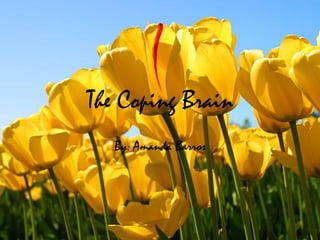
The coping brain
- 1. The Coping Brain By: Amanda Barros
- 2. What is the Coping Brain? The Coping Brain is when we are faced by a challenge that is new to us or upsetting, our brain comes up with ways to deal with our stress or worry. Sometimes our brains need to find healthy ways to deal with situations because the old ways don’t help any longer. When we train our brains to use coping methods, it means we can repair our own emotional scars so we have more confidence.
- 4. Skills for the Coping Brain Using our parents to Cope: We observe our parents. As a baby we use mostly instincts -- the emotional brain, and protective reptilian brain -- to help us survive during a time when we are helpless and dependent upon parents for our survival. Parents are the most important people to help us cope with our fears. When baby falls down, mom or dad quickly come to the rescue by holding baby close and comforting it by letting them know they are safe, loved and protected. If a baby’s parents are often upset, fearful, angry or sad it is hard for a baby to be cheerful and happy. Using other family members to cope: Next to mom and dad, our next coping teachers are other family members like brothers and sisters, or close relatives like grandparents, aunts or uncles. They teach us by displaying their own coping behavior; and they help us deal with our hurts with their love and caring for us when we are young. Any of our close family members can become our coping models until we become old enough to play with other children. Using our peers - their friends and classmates: Young children are often frightened the first days when they go off to day care, pre-school and kindergarten. This is the first time parents are no longer with them throughout the day. Both reptilian and emotional brains are powerful forces that make young children fearful when parents or regular care givers are no longer present to "fix" their hurts. Children begin to see new models for coping once they start nursery or pre-school. They are exposed to other children who exhibit their own coping styles or habits. Young children quickly learn new coping patterns from being around others and observing the way their friends and classmates deal with difficult situations. During their pre-teen, adolescent years we are old enough to choose from different types of coping patterns. We also begin to pay more attention to the coping habits of our peers.
- 5. Skills continued… Using teachers and school staff: Once we go off to kindergarten and elementary school all of a sudden we spend more time away from home and in the company of teachers, school staff and possibly after school caregivers. These teachers and school staff, like our parents, can also become important coping models for students from kindergarten and throughout elementary school. As we near the teenage years, students have usually begun to pattern the coping styles of both parents and teachers, since our neocortex is able to form our own unique coping habits. This is why the Brain Works and Coping Skills classroom education is useful helpful for pre-teens in grades 4, 5 and 6 whose thinking brain is capable of understanding new ways of coping with stress, upsets, anger and sadness. Using Entertainment media: TV, movies and video games to Cope: By the time we’re pre-teens many students are used to playing video games and watching TV and movies with lots of action and violent behavior. What kind of coping behavior do we learn from these forms of “entertainment?” There are many studies trying to understand if violent entertainment actual shapes a child’s way of coping with stress, frustration and emotional upsets. There is some evidence that students who have coping problems and can’t get over their upsets easily become addicted to violence in media and video games. Here is an observation you can test out by asking yourself and your friends the question: Why do we like watching or participating in violent games where there is a high chance of actual or simulated injury? Could it be that our reptilian survival brain instinctive need to “attack or hide” when we feel threatened is stimulated by this media opportunity to get “revenge” by using visual entertainment to feel we are getting even with someone or something that is or has caused us emotional pain? We don’t have evidence yet that can prove this theory, but knowing about our instinctive reptilian coping brains is what causes people around the world to spend millions or perhaps billions of dollars a year to be “entertained” with violent media.
- 7. Our oldest and strongest automatic coping response is from reptilian brain, which senses when we are physically (or emotionally) threatened by “danger.”
- 9. Cool Facts about Brains! The same part of the brain interprets both your physical and emotional pain. Stress over long periods can weaken the brain’s ability to learn and remember. Our brain requires 20% of the entire body’s blood flow and consumes 20% of the body’s supply of oxygen. The human brain contains 400 miles of blood vessels. Your brain generates up to 25 watts of power while you're awake---enough to light a light bulb!
- 10. Emotional Brain Coping Characteristics 1. Instinctive survival when dependant on others.2. Emotional expression3. Social identity and emotional connection with others4. Mutual love and emotional bonding5. Compassion and empathy with others6. Joyful feelings of happiness and excitement7. Enjoyment of play8. Our sense of emotional distress and sadness9. Our emotional preferences, likes and dislikes10. Our sense of shame, rejection and acceptance